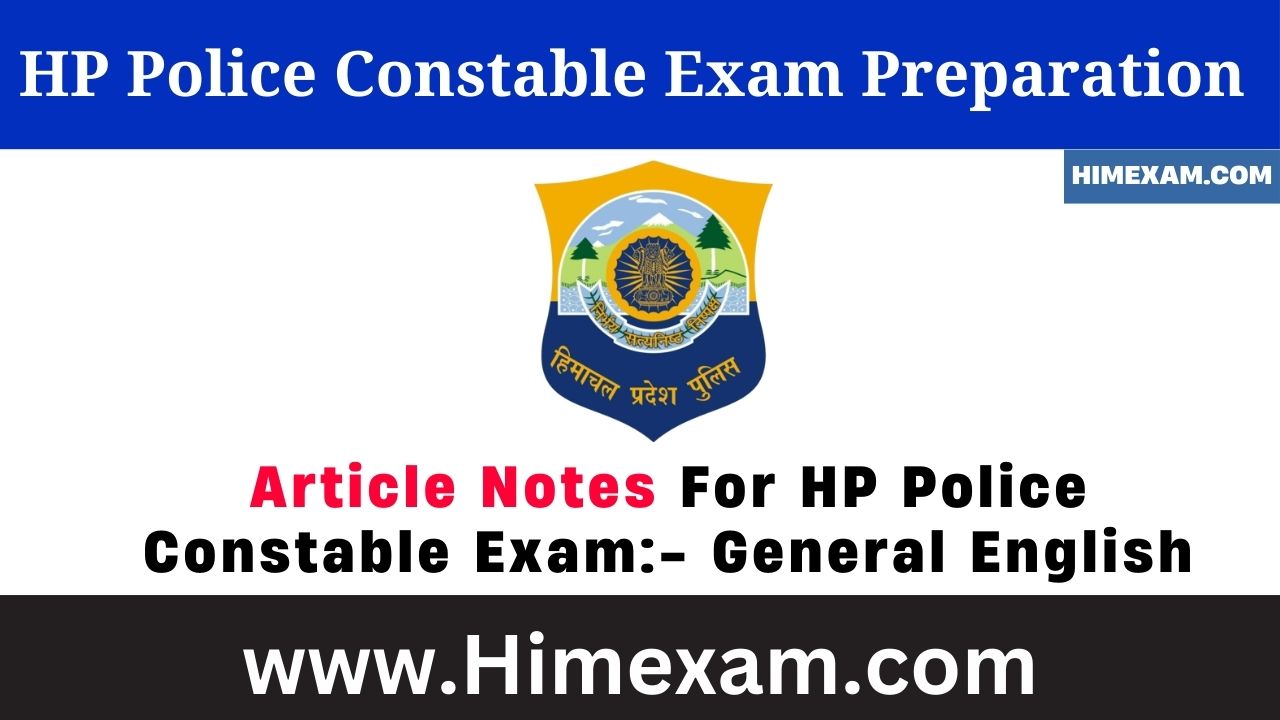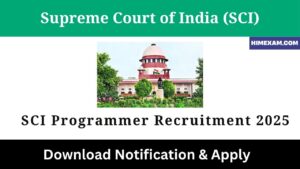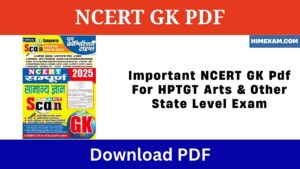Table of Contents
ToggleArticle Notes For HP Police Constable Exam:- General English
Definition (परिभाषा)
अंग्रेजी व्याकरण के अंतर्गत A, An और the को Articles कहा जाता है। इनका प्रयोग noun से पहले noun को सीमित करने या परिभाषित करने के लिए किया जाता है। ये Adjectives हैं और Modern English Grammar में इन्हें determiners के रूप में भी प्रयोग किया जाता है।
HP POLICE CONSTABLE EXAM TEST SERIES (15 TEST WITH ANSWER KEY):- BUY NOW
Articles दो प्रकार के होते हैं।
- Definite Article (The)
- Indefinite Articles (A, An)
Definite Article The का प्रयोग noun (संज्ञा) की निश्चित स्थिति को बताने के लिए किया जाता है, जिससे noun का प्रयोग स्पष्ट हो जाता है।
Example 1 I will pick him up at the airport. मैं उसे हवाई अड्डे पर लेने आऊँगा।
Example 2 Do you like the man who comes here daily. क्या आप उस आदमी को पसंद करते हो, जो यहाँ रोज आता है।
- यहाँ Example 1 Airport एक noun है और इससे पहले the (Definite Article) का प्रयोग कर बताया गया है किसी particular ‘Airport’ की बात की जा रही है। ऐसे ही Example 2 में man (noun) से पहले the का प्रयोग कर किसी particular, ‘man’ अर्थात व्यक्ति विशेष की बात की जा रही है।
Indefinite Articles A or An का प्रयोग किसी noun (संज्ञा) की स्थिति को uncertain (अनिश्चित) बनाने के लिए किया जाता है, जिससे noun (संज्ञा) की position (स्थिति) अस्पष्ट रहती है।
Example 1 I bought an inkpot. मैंने एक दवात खरीदी।
Example 2 A cow was sitting on the road. एक गाय सड़क पर बैठी थी।
- यहाँ Example 1 में inkpot (noun) के पहले an का प्रयोग ये बताता है कि यहाँ किसी अनिश्चित (uncertain) दद्वात की बात हो रही है। वहीं Example 2 में cow (noun) के पहले ‘a’ का प्रयोग बताता है कि यहाँ किसी अनिश्चित ‘गाय’ की बात हो रही है।
Use of Indefinite Articles ‘A’ and ‘An’
‘A’ और ‘An’ का प्रयोग सामान्यतः ध्वनि (sound) के आधार पर निश्चित किया जाता है।
(i) ‘A’ का प्रयोग उन शब्दों (words) के पहले किया जाता है, जो किसी consonant (व्यंजन) से शुरू होते हैं।
Example (a) A bat ( c) A coat (b) A pen (d) A kite
ऊपर दिये गये Example में सभी words, consonants (B, C, P. K) से शुरू हुए हैं। अतः उनके साथ article ‘A’ का प्रयोग किया जायेगा।
(ii) ‘A’ का प्रयोग ऐसे words (शब्दों) के पहले होता है, जो किसी ऐसे vowels (स्वरों) से शुरू होते हैं, जिनका उच्चारण Consonants (व्यंजनों) का sound (ध्वनि) देता है।
Example. (a) A university (b) A universal language (c) A eucalyptus (सफेदा का पेड) (d) A European
ऊपर के सभी Ex में सभी words की शुरूआत Vowels से हुई है, परंतु उनका उच्चारण व्यंजन (Consonants) से होता है। जैसे University (यूनिवर्सिटी), Universal (यूनिवर्सल), Eucalyptus (यूकलिप्टस), European (यूरोपियन); इन सभी शब्दों का हिंदी उच्चारण व्यंजन से हुआ है।
(iii) ‘An’ का प्रयोग ऐसे words के पहले होता है, जो ‘H’ से शुरू होते हैं परंतु यहाँ पर ‘H’ एक silent sound देता है और शब्द का उच्चारण स्वर (vowel) से शुरू होता है। जैसे-
(a) An honest lady ) An honourable man (c) An hour (d) An heir
यहाँ पर सभी words ऐसे हैं, जो ‘h’ (consonant) से शुरू हुए हैं, परंतु उनका उच्चारण vowels (स्वरों) से आरंभ होता है, जैसे- honest hour ऑनेस्ट, honourable ऑनरबल, आवर, heir एयर। इसलिए इन शब्दों के साथ ‘an’ का प्रयोग होता है।
(iv) ‘An’ का प्रयोग vowels (स्वरों) से शुरू होने वाले शब्दों के पहले होता है; जैसे-
(a) An aeroplane (b) An American (c) An egg (d) An owl
यहाँ पर प्रयोग हुए सभी शब्द vowels (A, E, O) से शुरू हुए हैं, तो इनके साथ Article ‘An’ का प्रयोग हुआ है।
(v) ऐसे words (शब्द), जो किसी consonant (व्यंजन) से शुरू होते हैं, परंतु उनकी sound (ध्वनि) vowel की होती है, जैसे-
(a) An N.C.C. (b) An S.I. (c) An X-mas tree (d) An L.L.M.
उपरोक्त सभी words, consonants (व्यंजनों) से शुरू हुए हैं, परंतु उनका उच्चारण vowels (स्वर) की ध्वनि देता है। जैसे- N.C.C. (एन.सी.सी.), S.I. (एस.आई.), X-mas tree (एक्समैस ट्री), L.L.M. (एल.एल.एम)
Rule 1: ‘A’ या ‘An’ का प्रयोग उन words या units के पहले होता है, जो किसी निश्चित संख्या, दर, गति को बताने के लिए प्रयोग किये जाते हैं।
Ex 1 Your horse runs thirty kilometers an hour. आपका घोड़ा तीस किलोमीटर प्रति घंटा दौड़ता है।
Ex 2 Mr. Rakesh bought a dozen bananas. श्री राकेश ने एक दर्जन केले खरीदे।
Ex 3 Sugar is now being sold at Rs. 10/- a kilo. चीनी अब 10 रुपये किलो की दर से बिक रही है।
- यहाँ पर Ex 1 में एक गति की दर बताने के लिए Article ‘A’ ‘ का प्रयोग किया गया है।
- यहाँ पर Ex 2 में गिनती सूचक इकाई की निश्चित संख्या को बताने के लिए Article ‘A’ का प्रयोग हुआ।
- यहाँ पर Ex 3 में मूल्य की दर को प्रदर्शित करने के लिए Article ‘A’ का प्रयोग किया गया है।
Rule 2: ‘A’ या ‘An’ का प्रयोग (सभी) All का अर्थ देने के लिए भी होता है; जैसे-
Ex 1 A cow has four legs. गाय के चार पैर होते हैं।
Ex 2 A cat has two twinkling eyes. बिल्ली की दो चमकीली आँखें होती हैं।
यहाँ Ex 1 और Ex 2 में cow और cat के पहले ‘A’ का प्रयोग हुआ है, जिससे सभी cows और cats के होने का बोध होता है।
Rule 3: ‘A’ या ‘An’ का प्रयोग any (कोई) के sense में होता है, जैसे-
Ex 1 There was an old man. कोई बूढ़ा आदमी था।
Ex 2 I saw a man in the garden. मैंने बगीचे में कोई आदमी देखा।
यहाँ पर Ex 1 में an old man (कोई बूढ़ा आदमी) तथा Ex 2 में a man (कोई व्यक्ति)।
Rule 4: किसी वाक्य में most का प्रयोग very (बहुत) के sense (अर्थ) में करने के लिए most से पहले ‘a’ का प्रयोग करना आवश्यक है। a most very = बहुत
Ex 1 Jaipur is a most beautiful city. जयपुर बहुत ही खूबसूरत शहर है।
Ex 2 That is a most beautiful sunset. वह बहुत सुंदर सूर्यास्त है।
Rule 5: किसी class (वर्ग) तथा जाति का बोध कराना है, तो singular conuntable noun के पहले ‘a’ या ‘an’ का प्रयोग किया जा सकता है।
Ex 1 A lion is a carnivorous animal.. शेर एक माँसाहारी जानवर है।
Ex 2 An elephant is a naive animal. हाथी एक भोला (सीधा-सादा) जानवर है।
यहाँ Ex 1 में a lion = all lion Ex 2 में An elephant = All elephant
Rule 6: Each/Every (प्रत्येक) के sense (अर्थ) के लिए भी a’ या ‘an’ का प्रयोग होता है।
Ex 1 She goes to school once a month.. वह प्रत्येक महीने में एक बार स्कूल जाती है।
A month = every month
a week = every week अर्थात् a = every/each
Rule 7: यदि कभी proper noun (व्यक्तिवाचक संज्ञा) को common noun (जातिवाचक संज्ञा) के रूप में प्रयोग करना होता है, तो proper noun के पहले a/an का प्रयोग कर common noun बनाया जाता है।
Ex 1 You are a Shakespeare. तुम शेक्सपीयर के जैसे हो।
Ex 2 Suresh is a Bhupati of the street. सुरेश गली के भूपति जैसा है।
Shakespeare एक Proper Noun है जिसे Article ‘a’ के प्रयोग के बाद Common Noun में बदला गया है।
Rule 8: जब कोई दो Adjective, and से जुड़ने के बाद किसी Singular Countable Noun के पहले प्रयोग होते हैं और उसमें पहले वाले Adjective के साथ ‘a/an’ का प्रयोग हो, तो इससे एक ही व्यक्ति या वस्तु का बोध होता है। परंतु दोनों Adjetives के साथ ‘A/An’ का प्रयोग हो, तो दो अलग-अलग वस्तु/व्यक्ति का बोध होता है।
Ex 1 A red and a white bike stand there. एक लाल और एक सफेद बाइक है, वहाँ खड़ी होती है। Ex 2 She is a beautiful and intelligent girl. वह एक सुंदर और बुद्धिमान लड़की है।
Rule 9: जब कोई दो Noun, and से जुड़ते हैं और उसमें दोनों Nouns के पहले ‘A/An’ का प्रयोग हो, तो दो अलग-अलग व्यक्तियों या वस्तुओं का बोध होता है। परंतु यदि केवल पहले वाले Noun के साथ ही Article ‘A/An’ का प्रयोग हुआ है, तो वहाँ एक ही व्यक्ति/वस्तु का बोध होता है।
Ex 1 A principal and a manager will go there. प्रधानाचार्य और मैनेजर वहाँ जाएँगे। (दो अलग-अलग व्यक्ति)
Ex 2 A father and guardian has come. पिताजी और संरक्षक आये है। (एक ही व्यक्ति)
Rule 10: यदि किसी Verb को Noun बनाना है तो Verb से पहले A/An का प्रयोग कर उसका प्रयोग Noun के रूप में किया जा सकता है।
Ex 1 My elder brother wants to have a swim.
Ex 2 My sister goes for a walk. यहाँ Ex 1 में swim जोकि एक verb है से पहले ‘a’ का प्रयोग कर उसे noun बनाया गया है, और साथ ही walk (verb) को भी।
HP POLICE CONSTABLE EXAM TEST SERIES (15 TEST WITH ANSWER KEY):- BUY NOW
Rule 11: किसी भी plural noun को singular बनाने के लिए ‘a’ का प्रयोग किया जाता है।
Ex 1 Seventy girls group. A seventy-girl group.
Ex 2 Twenty years scheme. A twenty year scheme.
Ex 3 Eight days journey. A eight day journey.
Ex 4 Seven days forecast. A seven day foecast.
यहाँ सभी Ex में ‘a’ लगाकर noun को singular बनाया गया है।
Rule 12: What या How का प्रयोग Exclamation (विस्मयादिबोधक) के रूप में हो, तो How या What के बाद Singular Countable Noun के साथ ‘a’ का प्रयोग होता है।
Ex 1 What a beautiful day it is! वाह! यह कितना सुंदर दिन है।
Ex 2 How naughty a boy! कितना शरारती लड़का है।
(such/rather/many half + a/an + noun)
(so/too/as/+adjective + noun)
What + a/an + adjective + noun
How + adjective + a/an/ + noun
Rule 13: किसी अपरिचित व्यक्ति के लिए भी Proper Noun से पहले Indefinite Article ‘A’ का प्रयोग किया जाता है।
Ex A Mr. Gupta came to meet you. कोई. मि. गुप्ता तुमसे मिलने आये थे। A Mr. Sharma has come to stay here. कोई मि. शर्मा यहाँ रहने आये हैं।
A = any (कोई)
Rule 14: कुछ Uncountable Noun के साथ ‘a’ का प्रयोग
- Have a talk (✔)
- Have a dream (✔)
- Have a good day (✔)
- Have a nice day (✔)
- Have a fight (✔)
- Have a shower (✔)
- Have talk (x)
- Have dream (x)
- Have good day (x)
- Have nice day (x)
- Have fight (x)
- Have shower (x)
Rule 15: A/an के प्रयोग वाले कुछ phrases
- A love of. As a rule
- Catch a cold. In a hurry
- Have a fever At a stone’s throw
- In a dilemma. In a rage
- At a loss In a nutshell
- Have a pain Make a noise
- At a cost At a discount
- Take a meal Have a meal
- Make a deal with In a fix Make an excuse
Omission of a/an
Rule 16: post of/rank of/title of/position of/ job of/ के पहले A/An का प्रयोग नहीं होता है।
Ex 1 Rank of an S.P. (x) Rank of S.P. (✔)
Ex 2 The post of a clerk (x) The post of clerk. (✔)
Ex 3 The position of a peon. (x) The position of peon. (✔)
Use of Definite Article (The)
Rule 17: Dates के पहले the का प्रयोग होता है।
Ex 1 The 26th of January. (✔) 26th of January. (x)
Ex 2 The 14th of November. (✔) 14th of November. (x)
Ex 3 The 15th of August. (✔) 15th of August. (x)
Rule 18: वाद्य यंत्रों (Musical instruments) के नामों (names) के पहले ‘the’ का प्रयोग होता है।
Ex 1 Ruby plays the harmonium. (✔) रूबी हारमोनियम बजाती है। Ruby plays harmonium. (x)
Rule 19: कुछ adjectives के पहले यदि “The’ का प्रयोग किया जाए, तो उससे Class (वर्ग) का बोध होता है।
The + Adjective
Ex 1 The honest. (✔) = Honest people, The honests(x).
Ex 2
The old. (✔) = Old people, The olds. (x)
The poor =All poor
The blind =All blind
The rich =All rich
The needy =All needy
Exception (अपवाद)
- A sick man = एक बीमार आदमी
- An honest man = एक ईमानदार आदमी
- A lame man = एक लगंड़ा आदमी
- An old man = एक बूढ़ा आदमी
The + adjective से पूरी जाति का बोध हो रहा है। वहीं a/ an + adjective + noun (man) से एक विशेष व्यक्ति का बोध हो रहा है।
Rule 19: Ordinal numbers (क्रमवाचक विशेषण) First, second, third, fourth, fifth, sixth ….. etc. Next, last के साथ The का प्रयोग होता है।
Ex 1 Indira Gandhi was the first woman prime minister of India. इंदिरा गांधी भारत की प्रथम महिला प्रधानमंत्री थी।
Ex 2 The next bus is coming. अगली बस आ रही है।
Exception (अपवाद)
- At first, At last का प्रयोग the के बिना होता है अर्थात् At the first, At the last का प्रयोग नहीं होता है।
Rule 20: जब दो वस्तुओं के बीच समान decline (गिरावट) या enhancement (वृद्धि) होती है, तो वहाँ पर comprative degree के साथ ‘the’ का प्रयोग होता है।
the + comparative + sub + verb + the + comparative + sub + verb
Ex 1 The sooner you go, the better you get. (✔) जितनी जल्दी जाओगी, उतना अच्छा पाओगी। The sooner you go, better you get. (x) Sooner you go, the better you get. (x)
Rule 21: दो व्यक्तियों या वस्तुओं के बीच तुलना होने पर (Comparative degree + of the two + plural countable noun) के नियम का पालन होता है, comparative degree के साथ ‘the’ का प्रयोग होता है।
Rule 22: किसी वाक्य में Superlative degree (S.D.) का प्रयोग होने पर Superlative degree से पहले ‘the’ का प्रयोग होता है।
Ex 1 Ravi is the wisest man in his office. (✔) रवि अपने कार्यालय का सबसे बुद्धिमान व्यक्ति है। Ex 2 Ravi is wisest man in his office. (x)
Ex 2 में wisest के साथ ‘the’ का प्रयोग होगा।
Rule 23: Noun of + noun के नियम में first noun (प्रथम संज्ञा) के पहले ‘the’ का प्रयोग होता है
अर्थात् सही Rule The + noun + of + noun होता है।
Ex 1 The king of Mewar. (✔)
Ex 2 King of Mewar. (x)
Ex 3 King of the Mewar. (x)
HP POLICE CONSTABLE EXAM TEST SERIES (15 TEST WITH ANSWER KEY):- BUY NOW
Ex 2 में king के साथ ‘the’ प्रयोग होगा वहीं Ex 3 में second noun (Mewar) के साथ ‘the’ का गलत प्रयोग हुआ। यह first noun (king) के साथ आयेगा।
Rule 24: जब किसी वाक्य में Noun in apposition के case का प्रयोग होता है तो वहाँ पर common noun (जातिवाचक संज्ञा) के पहले the का प्रयोग होता है।
Ex 1 Shakespeare, the poet, was famous all over the world. (✔)
Ex 2 Shakespeare, poet, was famous all over the world. (x)
Ex 2 में poet (noun) के पहले the का प्रयोग होगा।
Rule 25: जब किसी वाक्य में Proper noun की तुलना समान गुणों वाले दूसरे Proper Noun से की जाती है, तो दूसरे Proper Noun (व्यक्तिवाचक संज्ञा) के साथ the का प्रयोग किया जाता है।
Ex 1 Jackie chan is the Amithabh Bachchan of China. (✔) जैकी चैन, चीन के अमिताभ बच्चन हैं।
Ex 2 Jackie Chan, is Amitabh Bachchan of China. (x)
Ex 3 The Jackie Chan is Amitabh Bachchan of China. (x)
Ex 2 में the का प्रयोग नहीं हुआ, second proper noun के साथ the का प्रयोग, व Ex 3 में the का प्रयोग Jackie Chan के साथ न होकर Amitabh Bachchan (second proper noun) के साथ होगा।
Rule 26: यदि किसी वाक्य में Time expressing words (समय सूचक शब्दों) के पहले next/last का प्रयोग होता है तो इनके साथ the का प्रयोग नहीं होता है। अर्थात् Next/last + time expressing words (week/months), evening / night/ day / morning/ year/ afternoon / midnight/noon/ name of days (Sunday/Monday)…… Name of months (January, February)
Ex 1 He will come next Monday. (✔) वह अगले सामेवार को आएगा।
Ex 2 He will come the next Monday. (x)
Ex 3 You went Mumbai last year. (✔) तुम पिछले वर्ष मुंबई गये थे।
Ex 4 You went Mumbai the last year. (✔)
Ex 2 में next से पहले the का प्रयोग नहीं होगा। Ex 4 में last से पहले the का प्रयोग नहीं होगा।
Rule 27: जब किसी वाक्य में Proper Noun की तुलना समान वर्ग (class) के किसी दूसरे Proper Noun की तुलना की जाए दूसरे Proper Noun के साथ the का प्रयोग होता है।
Ex 1 Surdas is the Milton of India. (✔) सूरदास भारत के मिल्टन हैं।
Ex 2 Saurabh is the Tendulkar of the street. (✔) सौरभ मौहल्ले का तेंदुलकर है।
Ex 1 में सूरदास (Surdas) को मिल्टन (Milton) के समान बताकर तुलना की गई है। वहीं Ex 2 में सौरभ की तेंदुलकर से तुलना की गई है।
Rule 28:-वाक्य में either of/each of a large number o/ many of/ most of both of some of all of/ half of the majority of/ several of / none of various of/ neither of आने पर इनके बाद the + plural countable noun/uncountable noun का प्रयोग किया जाता है।
Ex 1 Neither of the two boys is intelligent. (✔) दोनों में से कोई भी लड़का बुद्धिमान नहीं है।
Ex 2 Neither of two boys is intelligent. (x)
Ex 3 Half of the oil was used. (✔) आधा तेल खर्च हो गया।
Ex 4 Half of oil was used. (x)
Rule 29: अन्य स्थितियों (positions) में the का प्रयोग-
1. पर्वत श्रेणियों के नाम से पहले The Mount Albert, The Orizaba, The Hakakabo, The Himalaya, The Alps, The Eastern.
2. नदियों के नाम से पहले The The Indus, The Yamuna, The Koshi, The Nile, The Amazon, The Brahmaputra.
3.द्वीपों के समूह (Group of island) के पहले The: The East Indies, The Andaman and Nicobar,
4.नागरिकता या राष्ट्रीयता सूचक शब्दों (Nationality Expressing Words) के पहले The : The American, The Indian, The Australian, The Europeans, The Chinese, The Russians.
5. The का प्रयोग खाड़ी (Gulf/Bay), सागरों (Seas), महासागरों (Oceans) के नाम से पहले The Atlantic Ocean, The Antarctic Ocean, The Pacific Ocean, The Indian Ocean, The Bay of Bengal, The Gulf of Mexico, The Persian Gulf, The Caspian Sea, The Black Sea. The Dead Sea, The Red Sea. etc.
6. नहरों (Canals), समुद्री जहाजों (Ships), हवाई जहाजों (Aeroplanes), रेलगाड़ियों (Trains) के नाम के पहले The The Victoria, The Vikrant, The Maghdoot, The Rajdhani Express, The Pawan Express, The Punjabi Mail, The Soo canal, The Manchester canal, The Suez canal, The Panama canal.
7.Desert (रेगिस्तान) के नामों के साथ the The Arabian Desert, The Thar Desert, The Kalahari Desert, The Sahara Desert, The Mojave Desert.
8.दिशाओं (Directions) के नाम के साथ The The South, The North, The West, The East, The North-West, The South-West, The South-East, The North-East, The Downward, The Upward.
9.. धार्मिक ग्रंथों (Religious Books) के नाम के साथ The The Bible, The Gita, The Quran, The Ramayana, The Mahabharta, The Puranas, The Upanishads.
10.Government Branches (सरकार की शाखाओं) और Armed Forces (सशस्त्र सैनिक बल) के नाम के पहले The The Navy, The Police, The Army, The Airforce, The Executive (कार्यपालिका), The Legislature (विधायिका), The Judiciary (न्यायपालिका)।
11.Religious Community (धार्मिक सम्प्रदाय) के नाम के साथ The The Sikhs, The Christians, The Jews, The Muslims, The Hindus, The Persians.
12.Unique Things (अनोखी वस्तुओं) के नाम के साथ the: The Sky, The Earth, The Stars, The Sun, The Moon, The Universe, The Ocean, The Sea, The Rain, The Fog, The Air, The South Pole, The North Pole, etc.
13. ऐतिहासिक इमारतों (Historical Buildings) और ऐतिहासिक स्थानों (Historical Places) के नामों के साथ The The Red Fort, The Golghar, The Tajmahal, The Jal Mahal, The Qutub Minar, The Kurukshetra, The Panipat, The Pyramid, The Gandhi Maidan, etc.
14. ऐतिहासिक साम्राज्य (Historical Empire), ऐतिहासिक वंश (Historical Dynasty) के नामों के पहले The The Kushan Empire, The Gupta Empire, The Mughal Empire, The Vijay Nagar Empire, The Slave Dynasty (गुलाम वंश), The Mauryan Dynasty (मौर्य वंश), The Pal Dynasty, The Chandel Dynasty, The Solanki Dynasty, etc.
15. ऐतिहासिक घटना (Historical Event), ऐतिहासिक काल/अवधि (Historical age/period) के साथ The: The French Revolution, The English Revolution, The Civil War, The Battle of Panipat, The Elizabethan Age, The Victorian Age, The Middle Age, The Restoration Period, etc.
16. ऐतिहासिक जाति (Historical Caste), राजनीतिक दलों (Political Parties) के नामों के साथ The: The Pygmies, The Aryans, The Red Indian, The Negroes, The Janta Dal Party, The Democratic Party, The Congress Party, The Bhartiya Janta Party, etc.
17. क्लबों, सिनेमाघरों, होटलों, पुस्तकालयों, भोजनालयों, नाटकगृहों के नामों से पहले The The Nirvana Club, The Happy Karma Night Club, The Mysore Palace Club, The Apasara restaurant, The Hilton restaurant, The Tajmahal Hotel, The Shoka Hotel, The National Museum, The Louvre Museum, The Indian Museum, The British Library, The National Library of India, The Congress Library, The Shiela Theater, The Carnival Cinemas, The Raj Mandir Cinema, etc.
18.शरीर के अंगों के नाम से पहले The: The arm, The leg, The eyes, The hand.
19. बीमारियों के नाम के बाद Parts of body के पहले The का प्रयोग cancer of the lungs.
Omission of Articles (Articles का विलोपन)
Rule 30: School, College, Sea, Work, Bed, Table, Market, Hospital, Prison, Home, Church, Temple, Court. जब वाक्य में इनका प्रयोग उसी उद्देश्य के लिए होता है, जिनके लिए इनका निर्माण हुआ है, तो The का प्रयोग नहीं होता है।
Ex 1 She often goes to church on Sundays. वह अक्सर रविवार को चर्च जाती है।
Ex 2 Father goes to bed early. पिताजी जल्दी सो जाते हैं।
Ex 3 She is going towards the church. वह चर्च की ओर जा रही है।
Ex 4 The thief took the bed. चोर बिस्तर को ले गया। Ex 1 में church का प्रयोग प्रार्थना के लिए हुआ है, जिसके लिए वो बना है। Ex 2 में भी bed का प्रयोग सोने के लिए हुआ है, अतः वहाँ the का प्रयोग नहीं हुआ, परंतु Ex 3 में church का प्रयोग प्रार्थना के लिए नहीं दिशा बताने के लिए और Ex 4 में bed का प्रयोग चोरी करके ले जाने में हुआ है इसलिए जो कि इस उद्देश्य के लिए नहीं बने हैं। अतः The का प्रयोग हुआ है। परंतु यदि इनका प्रयोग Countable Noun के रूप में होता है, तो ‘A/An’ का प्रयोग किया जाता है।
Exception (अपवाद)
Bus stop, Theater, Circus, Cinema, Office, Movie, Station के साथ The प्रयोग होता है।
Rule 31: यदि किसी नदी के नाम के साथ शहर का नाम है, तो नदी के नाम से पहले the का प्रयोग नहीं होगा।
Ex 1 Delhi on Yamuna. (✔) Delhi on the Yamuna. (x)
Ex 2 Shri Rangapattanam on Kaveri. (✔) Shri Rangapattanam on the Kaveri. (x)
Hudson Bay (हडसन की खाड़ी) के साथ the का प्रयोग नहीं होता है .
Rule 32: दिशा के नाम के साथ किसी स्थान का नाम हो, तो the का प्रयोग नहीं होता है।
Ex 1 South Africa. (✔) The South Africa. (x)
Ex 2 West Bengal. (✔) The West Bengal. (x)
Ex 3 South Korea. (✔) The South Korea. (x)
Rule 33: धार्मिक ग्रंथों के पहले लेखक (Author) का नाम हो, तो ग्रंथों के नाम से पहले the का प्रयोग नहीं होगा।
Ex 1 Tulsi’s Ramayana. (✔) Tulsi’s the Ramayana. (x)
HP POLICE CONSTABLE EXAM TEST SERIES (15 TEST WITH ANSWER KEY):- BUY NOW
Rule 34: किसी विशेष द्वीप के साथ the प्रयोग नहीं होता है।
Rule 35: Kind of, variety of, type of, sort of के साथ प्रयोग हुए noun (संज्ञा) के पहले The/A/An का प्रयोग नहीं होता है।
Ex 1 What kind of book is this? (✔) यह किस प्रकार की पुस्तक है?
Ex 2 What kind of a/the book is this? (x)
Ex 3 She did not like this type of hair style. (✔) उसे इस प्रकार के बालों की शैली पसंद नहीं आयी।
Rule 36: Parliament, Life, Death, Nature, Science, Love, Society इत्यादि के साथ The का प्रयोग नहीं होता है।
Ex 1 Death is inevitable. (✔) मृत्यु अटल है।
Ex 2 The death is inevitable. (x)
Ex 3 Love is a pleasant feeling. (✔) प्रेम एक सुखद अनुभूति है।
Ex 4 The love is a pleasant feeling. (x)
Rule 37: यदि किसी वाक्य में Either, Neither, Every, Each का प्रयोग है और इसके साथ Singular Noun का प्रयोग है, तो The का प्रयोग नहीं होगा।
Ex 1 Every man is honest. (✔)
Ex 2 Every the/a man is honest. (x)
Ex 3 Each girl is intelligent. (✔)
Ex 4 Each a/the/ girl is intillenent. (x)
Rule 38: जब कभी भी वाक्य में by के साथ means of transport (यातायात के साधन) आता है, तो The/A/An का प्रयोग नहीं होता है।
Rule 39: बीमारियों (diseases) और त्योहारों (festivals) के नामों के साथ the का प्रयोग नहीं होता है।
Rule 40: किसी भी University (विश्वविद्यालय) के नाम के साथ the का प्रयोग नहीं होता है।
More Pages:-
हेलो दोस्तों ,आपका हमारी वेबसाइट Himexam.com पर स्वागत है। जैसा की आपको पता है हमारी वेबसाइट Himexam.com आपको समय-समय पर सभी HP Govt Jobs & All India Govt Jobs की Notifications प्रदान करवाती है। साथ ही साथ Himachal Pradesh Exam Previous Paper और Himachal Pradesh GK ,Himachal Pradesh & National +International Current Affairs के सभी नोट्स मुफ्त उपलब्ध करवाते है। हमारी वेबसाइट के अलग अलग प्लेटफार्म पर pages & Group बने है जैसे की facebook ,Telegram और Instagram .. अगर आप हिमाचल के किसी भी पेपर की तैयारी कर रहे हो तो जल्दी से इन groups के साथ जुड़ जाएं इनके लिंक नीचे table में दिए गए है।
Join Us:-
| Like Our Facebook Page | Click here |
| Join Us oN Telegram | Click here |
| Join Us On Instagram | Click Here |








